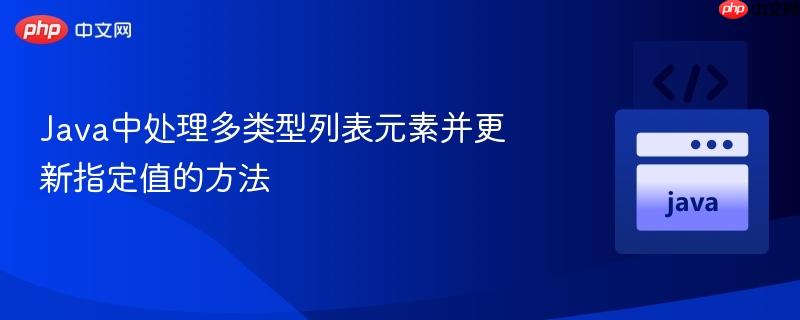
本文详细介绍了在java中如何操作包含多种类型对象的`list
在Java开发中,我们有时会遇到需要在一个列表中存储多种不同类型数据的情况。最常见的实现方式是使用List
直接对List
以下是实现这一过程的详细步骤和示例代码。
假设我们有一个List
立即学习“Java免费学习笔记(深入)”;
import java.util.ArrayList;
import java.util.List;
public class MixedTypeListManipulation {
public static void main(String[] args) {
// 1. 初始化一个包含多种类型元素的列表
List<Object> someList = new ArrayList<>();
someList.add("一个字符串"); // 索引 0
someList.add(100); // 索引 1 (Integer 类型)
someList.add(100.2); // 索引 2 (Double 类型)
someList.add(new CustomObject("自定义对象A", 50, 1.5)); // 索引 3
System.out.println("原始列表: " + someList);
// 假设我们要修改索引为 1 的元素
int targetIndex = 1;
// 2. 检查索引是否有效,防止IndexOutOfBoundsException
if (someList.size() > targetIndex) {
// 3. 获取原始值
Object originalValue = someList.get(targetIndex);
// 4. 进行类型检查:确保它是 Integer 类型
if (originalValue instanceof Integer) {
// 5. 强制类型转换,以便进行算术运算
Integer intValue = (Integer) originalValue;
// 6. 执行递增操作
intValue = intValue + 1; // 也可以写成 intValue++
// 7. 将修改后的值设置回列表
someList.set(targetIndex, intValue);
} else {
System.out.println("索引 " + targetIndex + " 处的元素不是 Integer 类型,无法递增。");
}
} else {
System.out.println("索引 " + targetIndex + " 超出列表范围。");
}
System.out.println("修改后的列表: " + someList);
// 尝试修改一个不存在的索引
int invalidIndex = 5;
if (someList.size() > invalidIndex) {
// ... (同上逻辑)
} else {
System.out.println("索引 " + invalidIndex + " 超出列表范围,无法修改。");
}
// 尝试修改一个非Integer类型的元素 (例如索引 0 的 String)
int stringIndex = 0;
if (someList.size() > stringIndex) {
Object value = someList.get(stringIndex);
if (value instanceof Integer) {
someList.set(stringIndex, (Integer)value + 1);
} else {
System.out.println("索引 " + stringIndex + " 处的元素不是 Integer 类型,无法递增。");
}
}
}
}
// 假设有一个自定义对象,如果列表存储的是自定义对象,则需要访问其内部字段
class CustomObject {
String name;
int count;
double price;
public CustomObject(String name, int count, double price) {
this.name = name;
this.count = count;
this.price = price;
}
public int getCount() {
return count;
}
public void setCount(int count) {
this.count = count;
}
@Override
public String toString() {
return "CustomObject{" +
"name='" + name + '\'' +
", count=" + count +
", price=" + price +
'}';
}
}运行结果:
原始列表: [一个字符串, 100, 100.2, CustomObject{name='自定义对象A', count=50, price=1.5}]
修改后的列表: [一个字符串, 101, 100.2, CustomObject{name='自定义对象A', count=50, price=1.5}]
索引 5 超出列表范围,无法修改。
索引 0 处的元素不是 Integer 类型,无法递增。List 当列表中确实需要存储多种不相关的类型时,使用List
instanceof与类型转换: instanceof操作符是运行时类型检查的关键。它能确保在执行强制类型转换时不会出现ClassCastException。在Java 16及更高版本中,instanceof支持模式匹配,可以进一步简化代码:
if (originalValue instanceof Integer intValue) {
someList.set(targetIndex, intValue + 1);
}自动装箱与拆箱: 在intValue = intValue + 1;这行代码中,Java的自动装箱(Autoboxing)和自动拆箱(Unboxing)机制发挥了作用。Integer对象intValue会被自动拆箱为int基本类型进行加法运算,然后结果int又会被自动装箱回Integer对象。
自定义对象中的值: 如果列表中存储的是自定义对象(如CustomObject),并且你需要修改其内部的某个int字段,那么你需要先获取到这个自定义对象,然后调用其对应的setter方法来修改字段值。由于对象引用本身没有改变,通常不需要再调用list.set(),除非你创建了一个新的自定义对象实例来替换旧的。
// 假设我们要修改索引 3 处的 CustomObject 的 count 值
int customObjectIndex = 3;
if (someList.size() > customObjectIndex) {
Object obj = someList.get(customObjectIndex);
if (obj instanceof CustomObject) {
CustomObject customObj = (CustomObject) obj;
customObj.setCount(customObj.getCount() + 1); // 直接修改对象内部状态
// 如果是修改对象内部状态,通常不需要 someList.set(customObjectIndex, customObj);
// 因为列表中的引用仍然指向同一个对象。
}
}
System.out.println("修改CustomObject后的列表: " + someList);这个示例会输出 CustomObject{name='自定义对象A', count=51, price=1.5},表明对象内部的count值已成功递增。
在Java中处理包含多类型元素的List
以上就是Java中处理多类型列表元素并更新指定值的方法的详细内容,更多请关注php中文网其它相关文章!

每个人都需要一台速度更快、更稳定的 PC。随着时间的推移,垃圾文件、旧注册表数据和不必要的后台进程会占用资源并降低性能。幸运的是,许多工具可以让 Windows 保持平稳运行。

Copyright 2014-2025 https://www.php.cn/ All Rights Reserved | php.cn | 湘ICP备2023035733号